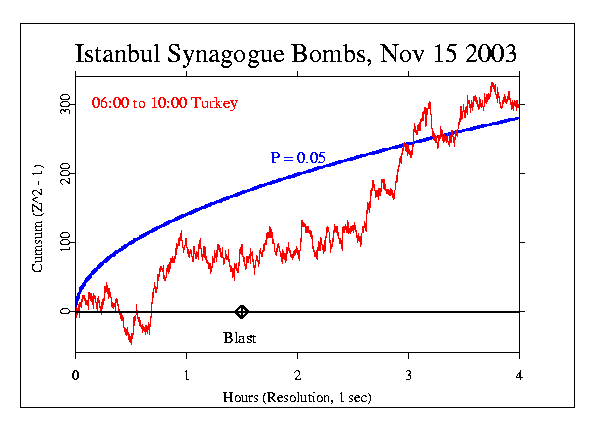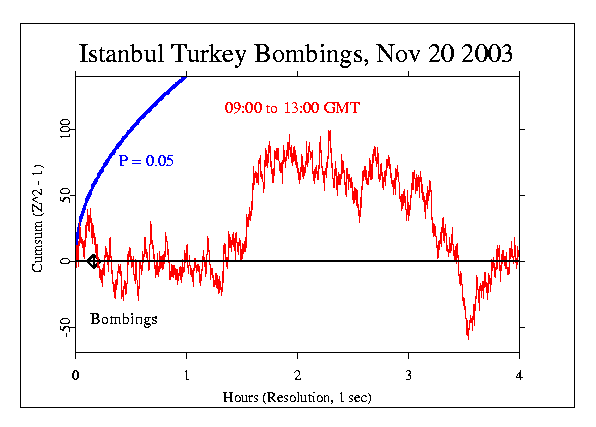|
There were two terrorist bombings in Istanbul, Turkey, a few days apart.
On November 15, 2003, a car bomb that exploded outside the Neve Shalom
synagogue ripped through the front of the building and shattered
windows for hundreds of metres around. According to BBC reports,
at the time of the bombing,
about 9:30 in the morning (0730 GMT), there was a Bar Mitzvah and
morning prayers inside, while the street outside was filled with
shoppers, storekeepers and electricians who trade in the area.
Eyewitnesses reported a scene of carnage on Buyuk Hendek
street immediately after the blast. A pall of acrid black smoke hung
over the narrow street, which was strewn with the dead and injured.
Most of the 23 killed and dozens injured were Muslim Turks
walking to work or out shopping.
The synagogue was full of worshippers but they seem to have been
largely protected by the front of the building.
Originally I could not get exact timing for the prediction, but a report
datelined 10:30
said it happened during morning prayers, so I set the formal prediction
for 06:00 to 10:00 GMT, which I thought should include the event and
some aftermath time. The figure below shows the four hours, and the
time of the blast is indicated. The Chisquare is 14698 on 14400 df, and
the associated p=value is 0.041.

The second bombing was five days later, again in Istanbul, this time
targeting British concerns. A blast at 11:10 local time (9:10 GMT) hit
a large bank, ripping off the facade. About two minutes later, another
bomb hit the British consulate. Almost 30 people were killed, including
the chief consular officer, and nearly 500 were injured. Again
many of the victims were Turkish bystanders and workers. The second
figure shows this period of time, which was again specified as four
hours, mostly aftermath. The Chisquare is 14398 on 14400 df, with
p=0.503.

The difference between the outcomes for these two events that are
similar in many respects is interesting to consider. Of course noise and
chance fluctuation are always present as plausible explanations, but in
addition, we may consider two distinguishing factors. One is the
religious or spiritual aspect, and the second is the matter of surprise
or even shock. The Synagogue bombing was the
first of this nature for several years, and awakened the Turks and the
world to the widespread character of the terror network. There was a
kind of awful preparedness for the second attack.
I am reminded of the significant response of our prototype array of
REG devices to the tragedy represented by Princess Diana's funeral,
and the very different "acceptance" of an
expected passing when we looked at Mother Teresa's funeral a week later.
|